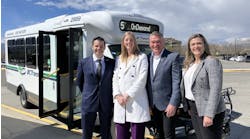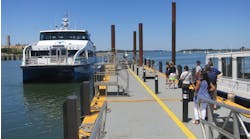Visitors to the Port Of Los Angeles can now access numerous popular waterfront destinations by bicycle thanks to a newly launched bike sharing system provided by the Los Angeles County Metropolitan Transportation Authority and the Port of Los Angeles.
Officials has unveiled 13 Metro Bike Share stations and 120 bikes at key waterfront locations, including Gateway Plaza and Fanfare Fountains, the Battleship IOWA, the Los Angeles Maritime Museum, the Catalina Sea and Air Terminal, the Downtown Harbor, Wilmington Waterfront Park, Ports O’ Call Village and more.
“Southern California is an incredible place to explore on a bicycle — now, we’re making it easier than ever to ride through Pasadena on two wheels,” said Los Angeles Mayor Eric Garcetti, Chair of the Metro Board. “The Metro Bike Share program has already brought a healthier, more sustainable transportation option to thousands of people in Downtown L.A., and we are thrilled to expand it even further across our region.”
Just 30 minutes from downtown Los Angeles and an hour to Catalina Island, the L.A. Waterfront is an increasingly popular local destination with two million visitors last year. The waterfront is also home to several development projects located in the harbor communities of San Pedro and Wilmington. Numerous outdoor activities and events are scheduled every year, including the next CicLAvia: San Pedro meets Wilmington presented by Metro on Sunday, August 13.
“Whether you are a local or visiting, you now have a new and fun option for exploring everything the L.A. Waterfront has to offer,” said Supervisor Janice Hahn. “We are on a mission at Metro to expand the Bike Share system across the County and it is great news for San Pedro and Wilmington that they are two of the first communities to get bikes installed.”
“The L.A. Waterfront is an ideal location for the Metro Bike Share program,” said Port of Los Angeles Executive Director Gene Seroka. “Bike Share users will enjoy up-close waterfront access and can easily explore museums, an aquarium, a battleship, craft marketplace, expansive marinas and beaches as well as dining and shopping. It’s a lot of area to cover on foot, so we’re thrilled to offer another way for visitors to experience and enjoy our waterfront.”
Monthly passes are $20 for unlimited 30 minute rides. Annual Flex Passes are $40 a year with each ride $1.75. Occasional users can walk-up to the station kiosk and purchase a single 30-minute ride for $3.50 with a credit card. Discounts on bulk passes are also available for employers through Metro’s Bike Share for Business program. A single pre-registered Metro TAP fare card can be used to ride Metro Bus and Rail lines and the Metro Bike Share system, making the Metro Bike Share system the nation’s most integrated with transit.
“Metro’s new bike share system is just a short distance from Metro’s Silver Line terminus, making first mile-last mile connections with L.A. County’s expanding transit system easily accessible,” said Phillip A. Washington, Metro CEO. “We will continue to expand bike sharing in our county as we move toward a more multi-modal system to address our region’s critical mobility needs.”
The Port of L.A. launch is part of a second phase for Metro’s Bike Share Program to expand the bike share network beyond downtown Los Angeles. A bike share launch in Venice is planned later this summer. The region’s bike share expansions combined will result in approximately 1,400 bicycles at up to 125 stations.
Metro has launched bike sharing in downtown L.A. and Pasadena. To date, more than 200,000 trips have been made on the system, with more than 495,000 miles traveled. More than 6,600 bike share passes have been sold. Metro’s bike share system has also helped prevent more than 471,000 pounds of carbon dioxide emissions – CO2 is a greenhouse gas that contributes to climate change.


